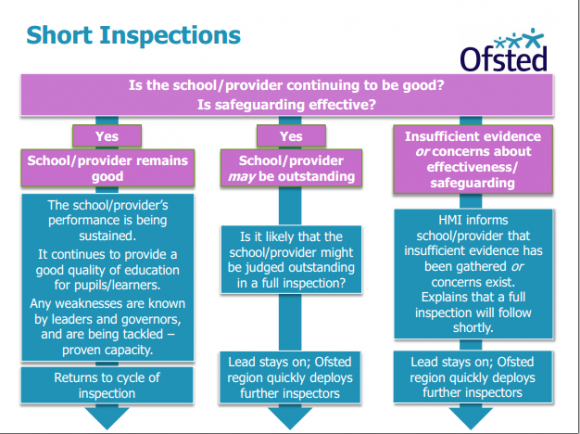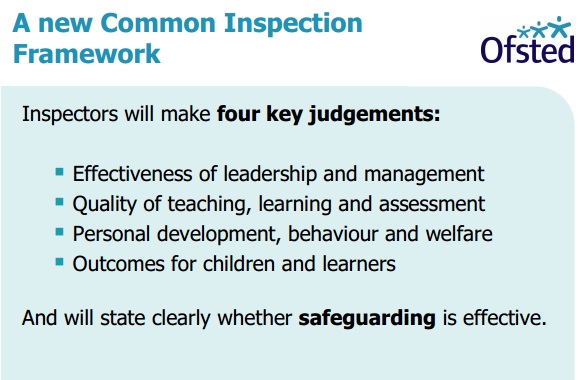Ofsted are telling us this morning that they have learnt a great deal from their 80+ pilot studies. They tell us that they have learnt some key lessons. However, when I read the four key points below, I wonder why they did not learn these lessons from the hundreds of inspections conducted previously?
Lessons we learned from the pilots:
- Overriding emphasis on leadership and its impact
- Strengthening inspection of safeguarding
- The impact of personal development, behaviour and welfare on learning
- Greater emphasis upon current progress for groups of pupils in the school
As for the Common Inspection Framework. I find that I spend a significant amount of time reviewing the content, structure and processes of inspection, so much so, that I often fail to step back and consider the value, evidence for, or motivation for, inspection itself. What I am encouraged to hear is repeated reference to dialogue and conversation.
Leadership and management is front and centre.
The ‘golden thread’ is focusing on the impact of leaders in key areas of school provision.
- Emphasis on impact across all key judgements
- Impact of the culture of the school
- Importance of safeguarding as a golden thread throughout all judgements, including the testing of leaders’ work to meet the new Prevent Duty
- The importance of a broad and balanced curriculum
- A brand new judgement – personal development, behaviour and welfare
- Alignment of the judgements on early years and 16-19 study programmes
Whilst our keynote speaker, spoke positively about the identification of a “broad and balance curriculum” quoting from the CIF Handbook, I continue to explore the influence of the accountability frameworks (Progress 8) and how a school curriculum models are constructed. I find it reassuring, when school leaders openly and genuinely set aside the accountability framework in the best interests for their pupils.
Short Inspections
“You are a good school…” – starts with your answer to this question, start with knowing why? What would be the key strengths you would present at the initial meeting with the HMI? As a leader I believe it is truly important to know thy self, as a teacher, as a department or area, as a school leader. Dare I say it, self-evaluation is more important than the plans for improvement.
Almost all the information you need to know can be read from the session notes. A few presentation points I would highlight; there is no defined Short Inspection process. Ofsted are telling us, that it is very much bespoke to the school. The signposts for conversion to a full inspection are often revealed at the “Meeting at the middle part of the day” – though concerns could be raised earlier if serious enough. Of course there is an opportunity for further dialogue, as we are only midway through the day? I wonder, in reality how stress that afternoon session might be.
Conversion to a full inspection usually happens with 48 hours. Following the full inspection, the overall effectiveness grade may not change.
The report letter is the summation of a Short Inspection. Written to the headteacher, published on the Ofsted website, in accessible language to all stakeholders.
Ofsted updates and newsletter also provide an interesting steer of their work on the Common Inspection Framework.
From September 2015, we are introducing a ‘free-text’ comment facility, which will allow parents to add comments to the Parent View online survey.
Changes to the process for monitoring inspections – From September 2015, schools that are judged to be inadequate or require improvement will receive their first monitoring inspection between three and six months following the section 5 inspection. The rationale behind the change is the need for inspectors to be in a position to assess more clearly the overall progress made by the school at that first visit and whether effective action is being taken to get the school to good.
[qr_code_display]



